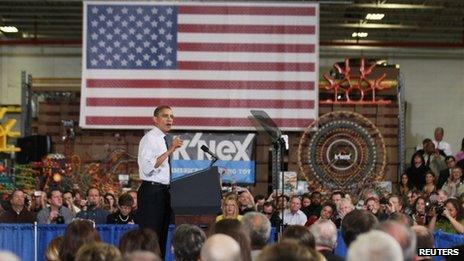Barack Obama takes 'fiscal cliff' plan to Michigan
- Published

US President Barack Obama has addressed Michigan car workers to build support for his plan to raise taxes on the rich and avert a looming "fiscal cliff".
The visit follows face-to-face meetings with Republican House Speaker John Boehner at the White House on Sunday.
After their first private talks since Mr Obama won re-election, both sides said communication lines "remain open".
Deep spending cuts and tax rises due to take effect on 1 January threaten to derail US economic recovery.
Extended benefits for the long-term unemployed and a temporary cut to payroll taxes are also scheduled to expire at the same time.
International observers, such as Christine Lagarde, head of the International Monetary Fund, have warned that there would be ripple effects for the rest of the world if US lawmakers are not able to agree to a deal.
Tax rise hit
Mr Obama's appearance at a car factory outside Detroit was his latest public outreach effort to sell a plan that would increase taxes for the rich while extending Bush-era tax cuts for everyone else.
During Monday's campaign-style event he told auto-workers that while he was prepared to negotiate on some issues, he "won't compromise" on tax rises. He avoided criticising Republicans directly.
Mr Obama promised Democrats would "make some tough spending cuts on things that we don't need" as part of his budget plans, but he did not mention any specific cuts by name.
Without action by Congress, the president said, middle-class families would see a $2,200 (£1,369) rise in taxes in 2013.
"That's a hit you can't afford to take," he said,
Mr Obama also waded into the contentious issue of "right-to-work" laws in Michigan - a law backed by state lawmakers on Friday under which employees in a unionised workplace can refuse to join the union or pay union dues.
Proponents say the proposals will bring more jobs and economic benefits to Michigan, while opponents say the laws are designed to weaken unions and lead to lower wages. On Monday, Mr Obama sided with the unions fighting right-to-work.
"These so-called 'right to work' laws, they don't have to do with economics, they have everything to do with politics," Mr Obama said. "What they're really talking about is giving you the right to work for less money."
'Shifting focus'
The president's proposal to avoid the fiscal cliff calls for $1.6tn (£990bn) in new tax revenue over 10 years.
Mr Boehner, the top Republican in Congress, has said that he is prepared to consider increasing tax revenue - by closing loopholes and limiting deductions rather than raising rates.
Neither side revealed details about the meeting between Mr Boehner and Mr Obama on Sunday, but representatives released identical statements saying "the lines of communication remain open".
On Monday, White House spokesman Jay Carney told reporters travelling with the president to Michigan: "The president does believe that we can reach an agreement.
"We, broadly speaking, continue to engage in this process with important players and stakeholders."
Although Republicans are philosophically opposed to raising taxes, some congressmen have recently suggested they would consider agreeing to Mr Obama's demand.
Republican Senator Bob Corker told Fox News on Sunday: "There is a growing group of folks looking at this and realising that we don't have a lot of cards as it relates to the tax issue before year end."
He added that if Republicans accepted the higher top tax rate, "the focus then shifts to entitlements, and maybe it puts us in a place where we actually can do something that really saves the nation".
The Republican counter-offer would aim to collect $800bn in revenue by closing tax loopholes and deductions.
Christine Lagarde spoke to the BBC's Katty Kay
It would also reduce government spending by $1.4tn, raising from 65 to 67 the age of eligibility for Medicare, a popular healthcare programme for the elderly, and by changing the way annual increases in Social Security payments are calculated.
So far, Democrats have appeared reluctant to discuss reforms to major entitlement programmes.
Senate Democratic Whip Dick Durbin told NBC News on Sunday: "We need to address that in a thoughtful way through the committee structure after the first of the year."
The White House has repeatedly said it would not support any deal that did not increase tax rates on the wealthiest.
If a deal cannot be reached, economists say the fiscal cliff would suck about $600bn out of the economy.
The measures were partly put in place within a 2011 deal to curb the yawning US budget deficit.